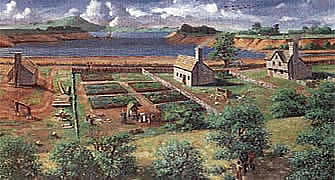
Courtesy of the National Park Service
Freedom of religion is a founding principle of American democracy. One of the strongest advocates of this American ideal was Roger Williams. Throughout his life, Williams fought for the idea that religion should not be subject to regulation by the government, but that it should be an individual freedom. Roger Williams National Memorial commemorates the life and legacy of this influential figure.
Born in London in 1603, Williams became an ordained minister in the Church of England. Even though he was an Anglican clergyman, William maintained personal beliefs that were more like those of the Puritans. The English monarchy considered the Puritans religious dissenters because they wanted to simplify and purify the Church of England. During this time, the English monarchy dealt very harshly with religious dissenters. Faced with the possibility of religious persecution, jail, or even death, Williams and his wife Mary decided to move to the new Massachusetts Bay Colony in 1631. A group of Puritans founded the Massachusetts Bay Colony in 1629, electing John Winthrop as governor.
Not long after arriving in the Massachusetts Bay Colony, Williams became a separatist, a Puritan who wanted to leave the Anglican Church. For Williams, not separating from the Church was “middle walking” and “halting between Christ and antichrist.” This view was far too radical for the colony at the time. Another of his radical views, one that was most influential in the founding of the United States of America, was that religion must not be subject to regulation by the state--that it should be a matter of individual consciousness. Most people during this time thought that that religious freedom and civil order could not co-exist.
Williams also clashed with colony officials over the rights of American Indians. He questioned English charters that took land from the Indians without any form of payment. His questioning of the charters was extremely controversial. Eventually, the Massachusetts Bay Colony had had enough of Williams’ radical views and his preaching of the separation of church and state, and sentenced him to deportation in 1636. Williams fled the colony to avoid arrest.
Williams fled on foot and spent the winter of 1635/36 with Massasoit, the chief sachem of the Wampanoag. In the spring, Massasoit gave Williams a tract of land along the Seekonk River where he and a handful of followers from Salem began to build houses and plant fields. Within a short time, Governor Winslow of Plymouth Colony advised Williams to move his settlement to the other side of the river because his current location was within the bounds of Plymouth Colony, which would not welcome him. Williams listened, crossed the river, and ultimately negotiated a land deal with the Narragansett Tribe. The Narragansett deeded Williams the land at the headwaters of Narragansett Bay in 1636, and in return, Williams agreed to let the Narragansett sachems take whatever English trade goods they wanted from him. Williams named the new colony Providence.
Providence, soon called Rhode Island, came to serve as a refuge where all people could come to practice any religion without interference from the state. The settlers of Providence formally agreed to “hold forth Liberty of Conscience,” making laws “only in civil things.” On July 8, 1663, Williams’ ideals of religious freedom and the separation of Church and State were codified into Rhode Island’s charter. The charter stated that Rhode Island would, "...hold forth a lively experiment, that a most flourishing civil state may stand and best be maintained, and that among our English subjects, with a full liberty in religious concernments; …That our royal will and pleasure is, that no person within the said colony, at any time hereafter, shall be anyway molested, punished, disquieted, or called in question, for any differences in opinion in matters of religion, and does not actually disturb the civil peace of our said colony; but that all and every person and persons may, from time to time, and at all times hereafter, freely and fully have and enjoy his and their own judgments and
consciences, in matters of religious concernments…" The Founding Fathers of the United States of America echoed Williams’ sentiment in the Declaration of Independence and the U.S. Constitution.
Visitors can remember and celebrate the life and legacy of this influential figure by taking a walk around the Roger Williams National Memorial and contemplating the importance of religious and cultural tolerance to the freedom and well being of human beings. The Memorial is a 4.5 acre landscaped urban park on the site of Williams’ original settlement in downtown Providence, Rhode Island. An 18th century building, the Antram-Gray House, serves as the Memorial’s visitor center, where visitors can view exhibits and watch videos that interpret Roger Williams' life and the many contributions he made to American society.
Visitors can also take a self-guided walking tour of the park. Stops along the tour include the Hahn Memorial, a memorial dedicated to the first person of Jewish faith elected to public office from Providence (it is located at the site of the fresh-water spring Roger Williams used to support his settlement); Bernon Grove, a memorial commemorating Gabriel Bernon, who was a 17th-century Huguenot who fled persecution in France and settled in Providence; and two 17th century interpretive gardens--a Native American garden and a Colonial Kitchen garden.
Roger Williams National Memorial, a unit of the National Park System, is located at 282 N. Main St. in the College Hill Historic District in Providence, RI. The Memorial is open from 9:00am to 4:30pm except Thanksgiving, Christmas, and New Years Day. For more information, visit the National Park Service Roger Williams National Memorial website or call 401-521-7266.
Last updated: July 8, 2019
